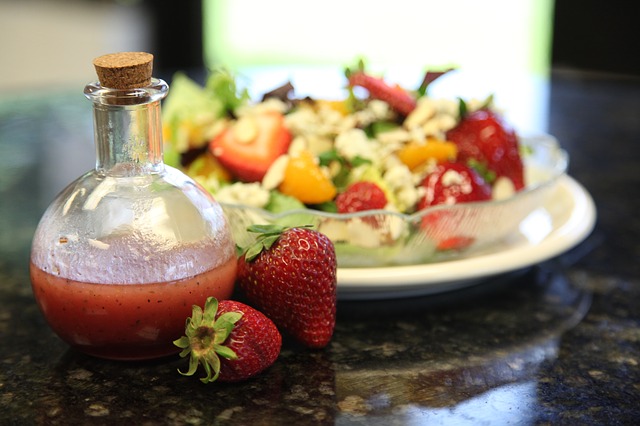My family can’t eat enough strawberries at this time of year! They are a good value at the farmers markets and grocery stores. Be careful to only purchase what you will use within a couple of days, to avoid having the strawberries get moldy and go bad. If you plan to buy strawberries in bulk, it’s a good idea to freeze what you’re not ready to use.
Strawberries are great as a snack. I like to add strawberries to vegetable salads or mix strawberries with different seasonal fruits for a beautiful and tasty fruit salad. Our favorite strawberry dessert is strawberry shortcake, using angel food cake or homemade biscuits as the “cake”.
If you are growing your own strawberries and have an abundance of them, try making strawberry jam. Your local Extension office can provide you with a recipe.
One of my favorite EFNEP recipes is the Strawberry Spinach Salad. Try for yourself!

Strawberry Spinach Salad
Makes 6 servings
Serving Size: 1 cup
Ingredients
1/2 teaspoon prepared mustard
1/2 teaspoon Worcestershire sauce
dash paprika
1/2 cup sugar
1/4 cup vegetable oil
1 1/2 teaspoons minced onion
1/4 cup vinegar
1 9-ounce bag fresh spinach
1 pint fresh strawberries, sliced
1/4 cup nuts, chopped (optional)
Dressing Directions
1. Combine all ingredients except spinach, strawberries, and nuts.
2. Using a fork or wire whisk, mix until well blended and sugar melts.
Salad Directions
1. Clean spinach and pat dry. Cut off stems and place in bowl.
2. Add sliced strawberries.
3. Drizzle dressing lightly to taste over spinach and strawberries.
4. Toss to coat.
5. Sprinkle nuts over top.
*Note: You can use leftover dressing for other salads or to marinate vegetables. You may add other fruits like drained pineapple chunks, grapes, or blueberries.
-Judy